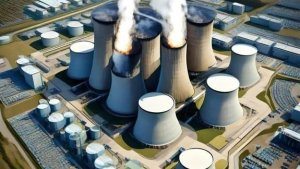Atomic Energy or Nuclear Energy
Atomic energy, which is also known as nuclear energy, has often been a topic of debate when it comes to its sustainability. Let’s examine and understand the different aspects to consider:
Process and Input, and Waste Management for Nuclear Energy
- Energy Generation: Nuclear energy is considered to be a very low-carbon energy source as it does not produce greenhouse gas emissions during electricity generation. In this context, it can contribute to reducing the overall carbon footprint and addressing climate change.
- Fuel Availability: Input for Nuclear power is uranium or, in some cases, plutonium as fuel. As per scientific exploration, uranium reserves are sufficient for the foreseeable future, they are not infinite. Therefore, nuclear energy is not considered a renewable energy source in the same way as solar or wind power, as it relies on finite fuel resources.
- Waste Management: One of the significant challenges with nuclear energy is the long-term management and disposal of radioactive waste generated during the nuclear fuel cycle. Radioactive waste must be stored and safeguarded to prevent environmental contamination and health risks. Developing safe and reliable waste management solutions is crucial for the sustainability of nuclear energy.
Safety, Security and Non-proliferation of Nuclear Energy:
- Safety Concerns: The safety of nuclear power plants is of paramount importance. Catastrophic events such as the Chornobyl and Fukushima accidents have highlighted the potential risks associated with nuclear energy. Ensuring the highest safety standards, proper maintenance, and rigorous regulatory oversight are essential for the sustainable operation of nuclear power plants.
- Non-Proliferation and Security: The use of nuclear technology for power generation requires stringent measures to prevent the proliferation of nuclear weapons. Safeguarding nuclear materials, preventing their diversion for illicit purposes, and maintaining robust security protocols are vital for the long-term sustainability and global security associated with nuclear energy.
In conclusion, the sustainability of atomic or nuclear energy is subject to debate. While it does offer low-carbon electricity generation, the challenges related to fuel availability, waste management, safety, and security need to be effectively addressed to ensure its long-term sustainability. Ongoing research and development efforts focus on enhancing the safety, efficiency, and waste management aspects of nuclear energy to mitigate its potential drawbacks and support its sustainable utilization.

Please refer for detail about regulatory (IAEA)